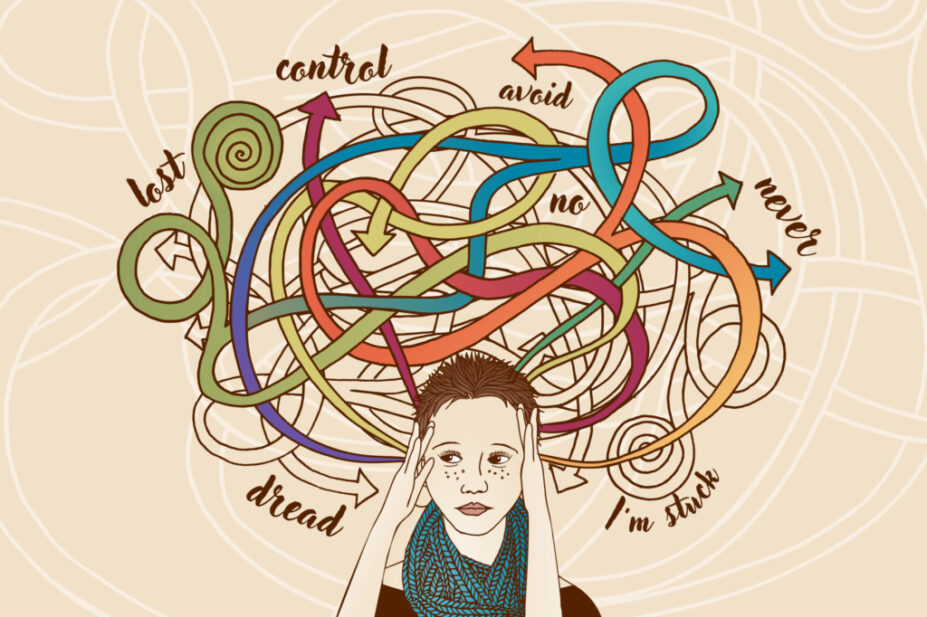
Shutterstock.com / MAG
For 32-year-old Cara Lisette, treatment for anorexia nervosa has been a near-constant fixture for more than half her life. She was first diagnosed with the eating disorder aged 13 years, when her mother sought help for her increasingly isolated daughter, who had lost interest in school and become preoccupied with her weight and food. Initially, her treatment comprised weekly psychotherapy sessions, but after 18 months, Lisette was admitted to hospital for 6 months, where she received intensive one-on-one therapy, group therapy and meal support. Afterwards, she was able to finish school and went on to college, trained as a nurse and got a job.
“[Hospital treatment] made a big difference for me,” Lisette says. “But not long term, because I ended up back in adult services later on.”
Characterised by self-starvation, anorexia nervosa is a psychiatric disorder that mainly affects adolescent women, who become invested in restricting their food intake. A fear of weight gain can morph into a general fear of loss of control.
The anxiety is so high, I just felt sick all the time
Cara Lisette
“The anxiety is so high, I just felt sick all the time,” Lisette says.
Anorexia nervosa revisited Lisette when she was 21 years. For the next ten years, she was in and out of outpatient adult services and engaging in talking therapies, such as cognitive behavioural therapy and psychodynamic therapy, which helps you understand how your current feelings and behaviour are shaped by past experiences and your unconscious mind and impulses.
In 2019, she resorted to an intensive day hospital programme for six months, which involved day-long clinic visits for meal, group therapy and other supports. Lisette credits this programme with helping her recover, but it required a heavy commitment.
“I was off work for six months, and that keeps you away from life because it’s full time,” says Lisette, who now works as a mental health therapist for children dealing with anxiety and depression in Hampshire.
This type of long-term treatment is typical for anorexia nervosa, which has a median illness duration of seven years. But treatment is fraught with risks, with a likely potential to relapse and, terrifyingly, the highest mortality rate of any psychiatric disorder[1–3].
There is no evidence base for pharmacological treatments specifically for anorexia nervosa, even though people have been trying everything for decades
Rebecca Park, associate professor in eating disorders psychiatry, University of Oxford
In the past, clinicians have looked to pharmaceuticals for help, but several antidepressants, antipsychotics and nutritional or hormonal supplements have failed in clinical trials[4]. As a result, no medicine has been licensed.
“There is no evidence base for pharmacological treatments specifically for anorexia nervosa, even though people have been trying everything for decades,” says Rebecca Park, associate professor in eating disorders psychiatry at the University of Oxford.
This problem has renewed urgency, owing to a record number of children and young people who have sought treatment for eating disorders since the COVID-19 pandemic struck the UK in 2020 (see Figure).
Ongoing efforts to find therapeutics for anorexia nervosa are drawing from unexpected places. Informed by neuroscience, some approaches are geared toward weight gain, which could help put the brain into a better state to benefit from psychotherapy. Other trials, including several of the psychedelic psilocybin, aim to enhance brain flexibility and encourage new thought and behaviour patterns.
“A useful therapeutic would help people to free up and not feel constantly stressed and driven, yet still be able to function,” Park says.
“For somebody to get to the point where they’re ready to let go of [anorexia nervosa], it is scary and challenging, and requires a lot of steel. And a lot of support.”
New therapeutic approaches offer hope to people who feel stuck with anorexia nervosa.
“It’s really, really difficult to recover from, and it’s really, really difficult to live with,” Lisette says. “When you’re in it, either option feels terrible.”
A fear-dampened life
Nature does not normally tell us not to eat, which makes anorexia nervosa baffling. Its exact causes are complex and unclear, but a seemingly innocuous decision to lose a little weight can escalate into this life-threatening disorder, when combined with genetic risk and personality traits, such as anxiousness, obsessiveness and perfectionism[5].
People with anorexia nervosa also struggle to see themselves as ill and will resist getting better. Their anxiety and rigid thought patterns may make it difficult to do well in school, get a job, or live independently.
They lose so much of their life
Guido Frank, professor of psychiatry, University of California, San Diego
“They live a fear-dampened life,” says Guido Frank, professor of psychiatry at the University of California, San Diego, who treats people with anorexia nervosa. “They lose so much of their life.”
In the UK, the prevalence of anorexia nervosa has been estimated at 0.3% among young women aged 11–34 years, while prevalence for men in the same age group is at 0.1%; together, this amounts to about 40,000 people. The estimates for those aged over 35 years are 0.075% for females and 0.025% for males[6,7].
Current treatments focus on weight gain, psychotherapy, and some pharmacotherapies for anxiety or depression symptoms; however, the difficulty in treating anorexia nervosa makes for a significant burden. The results of one global outcomes review showed that 20% of patients remained ill four to ten years after diagnosis, and 5% had died owing to complications from starvation or suicide[8]. Less than half (47%) made a full recovery.
The persistently negative clinical trials of psychiatric drugs for anorexia nervosa may indicate a malnourished state of the brain, which could circumvent the effectiveness of current psychiatric medicines. For example, serotonin re-uptake inhibitor (SSRI) antidepressants may fail to alleviate depression symptoms in anorexia nervosa because they do not have much serotonin to work with in the first place — serotonin manufacture relies on protein ingestion.
Indeed, imaging has begun to document striking brain changes in anorexia nervosa.
“The lower the weight goes, the more we find the brain is out of sync and the different [regions] aren’t connecting or talking to each other properly,” says Park, who has conducted brain scanning studies in anorexia nervosa.
An international study, published in November 2022, revealed stark reductions in cortical thickness and volume across the brain in those with anorexia nervosa[9]. The structural changes were less pronounced in patients who had gained weight, which suggests that normalising weight can restore the brain and increase the benefits of drugs, such as SSRIs.
To boost the brain’s health through weight gain, researchers have been exploring an atypical antipsychotic called olanzapine, of which weight gain is a well-known side effect. A 2019 clinical trial showed that 16 weeks of olanzapine use increased body mass index compared with placebo, but did not change eating disorder symptoms[10]. Other studies have also found modest weight gain with olanzapine in adults[11].
But gaining weight can be extremely distressing for a person with anorexia nervosa, which makes people reluctant to participate in clinical trials, Frank says. “The eating disorder is providing a sense of safety for the folks with it. They’re very afraid of changing anything because change is danger.”
Opening minds
There are also signs that dopamine-mediated reward pathways in the brain are malfunctioning in anorexia nervosa, which could explain how a normally rewarding food stimulus becomes a dreaded one[12,13].
One idea is that the fear of eating takes over brain circuitry meant for true danger. Consistent with this, a study published in September 2022 by Frank and colleagues revealed altered food reward responses in the amygdala, a brain region involved in fear and anxiety[14].
Starvation-induced changes to the brain’s chemistry may also have a hand in this. Weight loss initially sensitises the dopamine system, making it overreactive. Frank has been exploring the use of low doses of aripiprazole, a dopamine 2 partial receptor agonist, to quell the dopamine system’s reactivity. So far, some small case studies have reported aripiprazole facilitates behaviour change and improves insight in adolescents with anorexia nervosa[15,16].
“It’s not a miracle treatment, but psychotherapists working with anorexia nervosa see the benefits in that it’s like opening the door so people are then more open to working on their problems,” Frank says.
Another approach attempts to reset the outlook of a person with anorexia nervosa with psychedelics. Several clinical trials of psilocybin — the active ingredient in magic mushrooms — are underway. Psilocybin stimulates serotonin 2A receptors in the brain, which are involved in mood, sleep and cognition. The hours-long psychedelic experience produces feelings of wellbeing and openness, and this short holiday from the illness may reveal the possibility of a different kind of life.
We think that the ‘stuckness’ and the rigidity in thinking in anorexia can be overcome by the treatment with psilocybin
Hubertus Himmerich, a clinician and researcher at King’s College London
“If you experience that you can still have life, that you can still have hope, this helps to motivate the patient for further therapy,” says Hubertus Himmerich, a clinician and researcher at King’s College London, who is leading a trial of psilocybin for anorexia, using ‘COMP360’ tablets of synthesised psilocybin manufactured by COMPASS Pathways.
A single dose of COMP360 may be enough: in 2022, a phase II study found positive results for people with treatment-resistant depression[17]. Similarly, an open-label study of COMP360 for anorexia nervosa found reductions in eating disorder symptoms in some participants[18].
In February 2023, Himmerich and colleagues started a phase II proof-of-concept study of COMP360 psilocybin therapy involving 60 people with anorexia nervosa, which is estimated to be completed by December 2023[19]. Because it is difficult to hide a psychedelic experience, the trial has a low dose control — participants will be randomised to take either 1mg or 25mg of psilocybin in tablet form at a research facility, then stay in a bed for several hours with a therapist and health monitor on hand.
Following the experience, participants will continue to receive psychological support. The primary outcome measure is eating disorder symptoms measured several times after the experience, with the last one 12 weeks after the administration session.
Two other trials of psilocybin therapy for anorexia nervosa are also ongoing[20,21].
Experts say that psilocybin may also restore brain plasticity, which could promote cognitive flexibility and memory.
“We think that the ‘stuckness’ and the rigidity in thinking in anorexia can be overcome by the treatment with psilocybin,” Himmerich says.
He is also planning a clinical trial of the anesthetic ketamine, which may also aid brain plasticity. People with anorexia nervosa have memory problems, which can make it harder for them to remember what was discussed in psychotherapy and what life was like before their illness.
“They don’t remember what the outside world looks like and so they cannot make plans in great detail,” Himmerich says. “So if a medication stimulates neuroplasticity, then you can remember things better, which means you can also better plan for the future.”
Dire funding
Studies of eating disorders are a relatively new addition to psychiatric research. In the UK, research programmes are fragmented and funding is uneven.
“It’s dire, absolutely dire,” Park says about the state of anorexia nervosa research.
The neglect may in part reflect an old view that accuses girls with anorexia nervosa as just being difficult.
“The idea was that you just needed to feed them up and then everything would be fixed,” Park says. “That is hopefully changing.”
In September 2021, the All-Parliamentary Group on Eating Disorders compiled a report on the state of eating disorder research funding in the UK[22]. The findings highlighted how eating disorder research received just 1% of the total UK funding assigned to mental health research between 2015 and 2019, even though eating disorders account for around 9% of the total number of people with a mental health condition in the UK, and referrals to eating disorder services are rising.
The report, ‘Breaking the cycle: An inquiry into eating disorder research funding in the UK’, also noted that this sets up a vicious cycle in which underfunded research programmes do not attract scientists, which in turn seems to validate the low levels of funding.
The report recommended a concerted, intentional effort to recruit and fund eating disorder research in the UK, and some funding bodies are beginning to heed the call. In 2022, the Medical Research Council announced funding of £4m to create eating disorder research networks in the UK[23]. The Medical Research Foundation also awarded £2.7m to seven UK researchers studying eating disorders[24].
This attention, combined with the new treatment approaches, is cause for optimism, Himmerich says.
“With this new wave of psychedelic research and atypical antipsychotic research, plus more funding, we can change the prospects [for people with anorexia nervosa],” he says.
“That makes me really hopeful for eating disorder research.”
- 1Støving RK, Andries A, Brixen K, et al. Gender differences in outcome of eating disorders: A retrospective cohort study. Psychiatry Research. 2011;186:362–6. doi:10.1016/j.psychres.2010.08.005
- 2Walsh BT, Xu T, Wang Y, et al. Time Course of Relapse Following Acute Treatment for Anorexia Nervosa. AJP. 2021;178:848–53. doi:10.1176/appi.ajp.2021.21010026
- 3Arcelus J, Mitchell AJ, Wales J, et al. Mortality Rates in Patients With Anorexia Nervosa and Other Eating Disorders. Arch Gen Psychiatry. 2011;68:724. doi:10.1001/archgenpsychiatry.2011.74
- 4Treasure J, Zipfel S, Micali N, et al. Anorexia nervosa. Nat Rev Dis Primers. 2015;1. doi:10.1038/nrdp.2015.74
- 5Watson HJ, Yilmaz Z, et al. Genome-wide association study identifies eight risk loci and implicates metabo-psychiatric origins for anorexia nervosa. Nat Genet. 2019;51:1207–14. doi:10.1038/s41588-019-0439-2
- 6How many people have an eating disorder in the UK? Beat. https://www.beateatingdisorders.org.uk/get-information-and-support/about-eating-disorders/how-many-people-eating-disorder-uk (accessed 22 Feb 2023).
- 7Smink FRE, van Hoeken D, Hoek HW. Epidemiology of Eating Disorders: Incidence, Prevalence and Mortality Rates. Curr Psychiatry Rep. 2012;14:406–14. doi:10.1007/s11920-012-0282-y
- 8Steinhausen H-C. The Outcome of Anorexia Nervosa in the 20th Century. AJP. 2002;159:1284–93. doi:10.1176/appi.ajp.159.8.1284
- 9Walton E, Bernardoni F, Batury V-L, et al. Brain Structure in Acutely Underweight and Partially Weight-Restored Individuals With Anorexia Nervosa: A Coordinated Analysis by the ENIGMA Eating Disorders Working Group. Biological Psychiatry. 2022;92:730–8. doi:10.1016/j.biopsych.2022.04.022
- 10Attia E, Steinglass JE, Walsh BT, et al. Olanzapine Versus Placebo in Adult Outpatients With Anorexia Nervosa: A Randomized Clinical Trial. AJP. 2019;176:449–56. doi:10.1176/appi.ajp.2018.18101125
- 11Han R, Bian Q, Chen H. Effectiveness of olanzapine in the treatment of anorexia nervosa: A systematic review and meta‐analysis. Brain and Behavior. 2022;12. doi:10.1002/brb3.2498
- 12Frank GKW, Shott ME, Stoddard J, et al. Association of Brain Reward Response With Body Mass Index and Ventral Striatal-Hypothalamic Circuitry Among Young Women With Eating Disorders. JAMA Psychiatry. 2021;78:1123. doi:10.1001/jamapsychiatry.2021.1580
- 13Frank GKW, Reynolds JR, Shott ME, et al. Anorexia Nervosa and Obesity are Associated with Opposite Brain Reward Response. Neuropsychopharmacol. 2012;37:2031–46. doi:10.1038/npp.2012.51
- 14Frank GKW, Shott ME, Pryor T, et al. Trait anxiety is associated with amygdala expectation and caloric taste receipt response across eating disorders. Neuropsychopharmacol. 2022;48:380–90. doi:10.1038/s41386-022-01440-z
- 15Frank GKW. Aripiprazole, a partial dopamine agonist to improve adolescent anorexia nervosa-A case series. Int. J. Eat. Disord. 2015;49:529–33. doi:10.1002/eat.22485
- 16Tahıllıoğlu A, Özcan T, Yüksel G, et al. Is aripiprazole a key to unlock anorexia nervosa?: A case series. Clin Case Rep. 2020;8:2826–33. doi:10.1002/ccr3.3271
- 17Goodwin GM, Aaronson ST, Alvarez O, et al. Single-Dose Psilocybin for a Treatment-Resistant Episode of Major Depression. N Engl J Med. 2022;387:1637–48. doi:10.1056/nejmoa2206443
- 18COMP360 psilocybin therapy shows potential in exploratory open-label studies for anorexia nervosa and severe treatment-resistant depression. COMPASS. 2022.https://compasspathways.com/comp360-psilocybin-therapy-shows-potential-in-exploratory-open-label-studies-for-anorexia-nervosa-and-severe-treatment-resistant-depression/ (accessed 22 Feb 2023).
- 19COMPASS Pathways. Efficacy and Safety of COMP360 Psilocybin Therapy in Anorexia Nervosa: a Proof-of-concept Study. ClinicalTrials.gov. 2022.https://clinicaltrials.gov/ct2/show/NCT05481736 (accessed 22 Feb 2023).
- 20Imperial College London. Psilocybin as a Treatment for Anorexia Nervosa: A Pilot Study. ClinicalTrials.gov. 2020.https://clinicaltrials.gov/ct2/show/NCT04505189 (accessed 22 Feb 2023).
- 21Johns Hopkins University. Effects of Psilocybin in Anorexia Nervosa. ClinicalTrials.gov. 2019.https://clinicaltrials.gov/ct2/show/NCT04052568 (accessed 22 Feb 2023).
- 22All-Party Parliamentary Group on Eating Disorders. BREAKING the CYCLE: An inquiry into eating disorder research funding in the UK. Beat 2021. https://beat.contentfiles.net/media/documents/APPG_Research_Funding_inquiry_report.pdf (accessed 22 Feb 2023).
- 23Eating disorders: £4 million committed to new research. Medical Research Foundation. 2023.https://www.medicalresearchfoundation.org.uk/news/over-4-million-committed-to-eating-disorders-research (accessed 22 Feb 2023).
- 24New investment in eating disorders and self-harm research. Medical Research Foundation. 2023.https://www.medicalresearchfoundation.org.uk/news/new-investment-in-eating-disorders-and-self-harm-research (accessed 22 Feb 2023).


